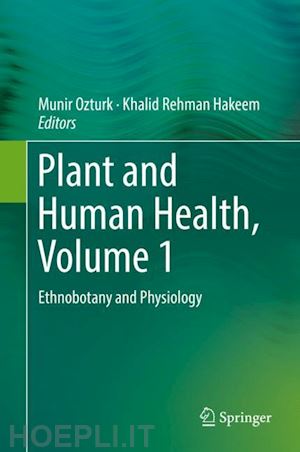
Questo prodotto usufruisce delle SPEDIZIONI GRATIS
selezionando l'opzione Corriere Veloce in fase di ordine.
Pagabile anche con Carta della cultura giovani e del merito, 18App Bonus Cultura e Carta del Docente
Foreword by Her Excellency Prof. Dr. Ammenah Gurib Fakim, President, Mauritius,- Turkey’s plant diversity and its opportunities from an ethnobotanical perspective.- Traditional plant based Chinese medicine.- Plants Used in the Traditional Medicine in East Africa.- Herbal Medicines from Palestine and Jordan.- Herbals from Hindukush.- Plants used in the traditional medicine in Sindh-Pakistan.- Medicinal and Aromatic Plants from Uzbekistan.- Herbal Medicine in Pakistan, Past, Present and Future.- Medicinal and Aromatic Plants of Igdir (Turkey), Nahçivan (Azerbaijan) and Tebriz (Iran).- Medicinal Aromatic Halophytes of Iran.- Traditional Medicine in Malang and Environs-Indonesia.- Agro-physiological aspects for domestication of Alliums as a crop for medicinal purposes.- Evaluation of poisonous plants from the plant diversity in Upper Mesopotamia.- Herbal folk medicine used in the treatment of hypertension and diabetes in Southeast Anatolian Region of Turkey.- Medicinal & Aromatic Plants of Sri Lanka.- Cosmetic uses of native plants in Turkey: Reflections on public health and economy.- Traditional Medicine in Azad Kashmir-Pakistan.- Herbals Used in the Folk Medicine of Kirghizistan.- Traditional Medicine Research and Development in Nigeria.- Medicinal Aspects of Andrographis paniculata.- Traditional and Modern Applications: A Case Study from South Indian Trees.- Indigenous Knowledge Systems and Product Development in South Africa.- Herbal Medicinal Plants and Traditional Herb Remedies.- Medicinal Plants of Kashmir Himalaya and Unani Medicine.- Bruneian Knowledge and Practice in Traditional Medicines.- Herbal Remedies by Medicinal Resources in Bhutan.- Traditional Medicine and Medicinal Plants in the Lao PDR.- Traditional Use and Research on Herbal in Mauritius.- Traditional Medical Science in Mongolia.- Status of Medicinal Plants and Prospects of their Cultivation.- IPR Protection and MAPS.











Il sito utilizza cookie ed altri strumenti di tracciamento che raccolgono informazioni dal dispositivo dell’utente. Oltre ai cookie tecnici ed analitici aggregati, strettamente necessari per il funzionamento di questo sito web, previo consenso dell’utente possono essere installati cookie di profilazione e marketing e cookie dei social media. Cliccando su “Accetto tutti i cookie” saranno attivate tutte le categorie di cookie. Per accettare solo deterninate categorie di cookie, cliccare invece su “Impostazioni cookie”. Chiudendo il banner o continuando a navigare saranno installati solo cookie tecnici. Per maggiori dettagli, consultare la Cookie Policy.